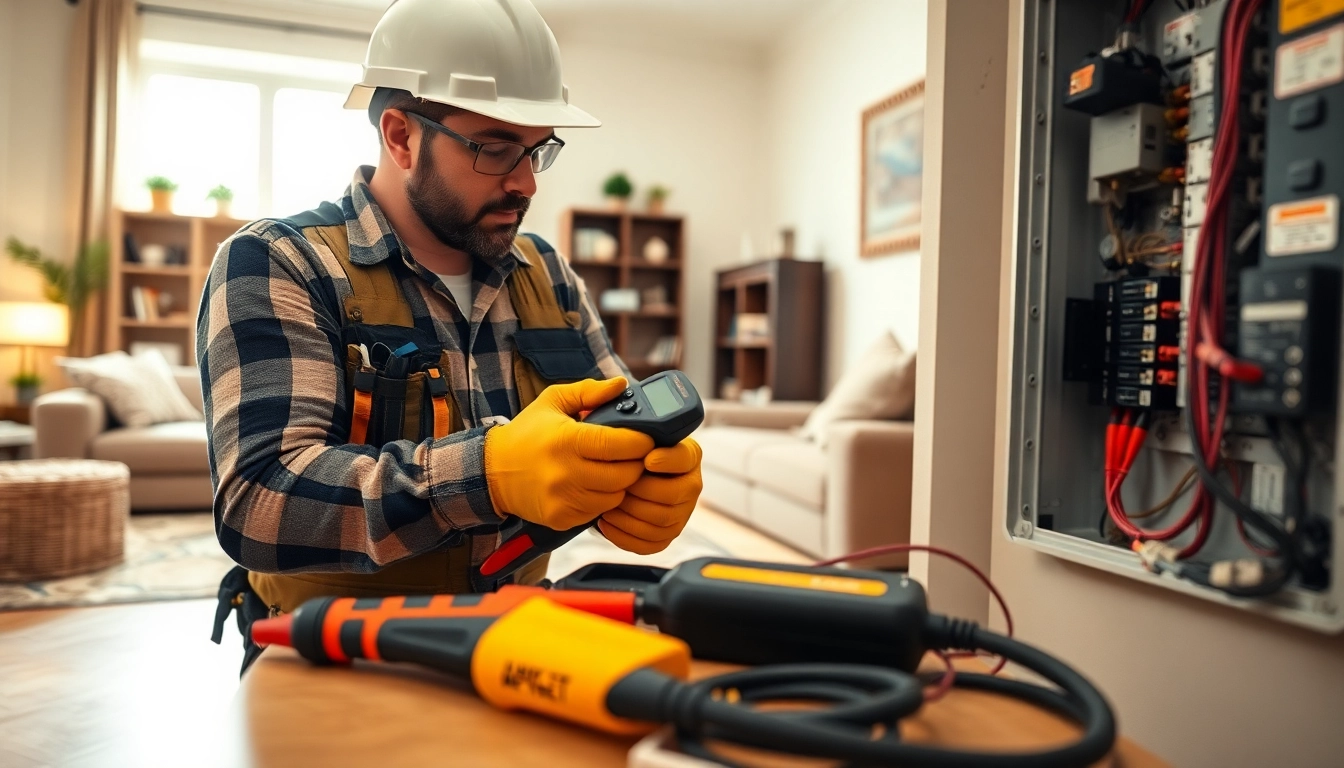Understanding the Electrician Profession
The role of an Electrician is pivotal in the modern economy, ensuring that our electrical systems operate smoothly and safely. Electricians work in various environments, including residential homes, commercial buildings, and industrial sites. They perform a broad array of tasks, from installing wiring and fixtures to troubleshooting electrical issues and adhering to safety regulations. As homes and businesses increasingly rely on complex electrical systems, the demand for skilled electricians continues to grow.
What Electricians Do
Electricians install, maintain, and repair electrical systems, including power distribution networks, solar energy technologies, lighting systems, and more. Their responsibilities can be categorized into several key areas:
- Installation: Electricians set up new electrical systems in buildings, involving the placement of wiring, circuit breakers, and outlets according to building plans and local codes.
- Maintenance: Regular maintenance tasks, such as checking electrical systems, replacing worn-out components, and upgrading outdated systems, are essential for ensuring safety and efficiency.
- Repair: When electrical issues arise, electricians diagnose problems and perform necessary repairs to restore functionality.
- Inspection: Electricians often conduct inspections of electrical systems to ensure compliance with codes and safety standards.
- Consultation: They may provide advice on energy efficiency and suggest upgrades to reduce power consumption.
Types of Electrician Roles
Electricians can specialize in various sectors, each requiring specific skills and knowledge:
- Residential Electricians: Focus on homes, performing tasks such as wiring new constructions, updating electrical systems, and installing lighting.
- Commercial Electricians: Work in commercial settings, handling larger systems and ensuring that business operations run smoothly.
- Industrial Electricians: Specialize in complex electrical machinery and industrial control systems, often in manufacturing facilities.
- Maintenance Electricians: Responsible for ongoing repairs and upgrades in various types of facilities, ensuring compliance with safety standards.
- Low-Voltage Electricians: Focus on low-voltage systems, such as telecommunications, security systems, and networking.
Key Skills Required for Electricians
The work of an electrician requires a blend of technical knowledge, problem-solving ability, and strong interpersonal skills. Some essential skills include:
- Technical Proficiency: Understanding electrical codes, circuit design, and safety regulations is crucial.
- Problem-Solving Skills: Electricians must quickly diagnose issues and find effective solutions.
- Physical Stamina: The job often involves manual labor and can require working in confined spaces.
- Attention to Detail: Precision is vital in electrical work to prevent hazards and ensure compliance.
- Customer Service: As electricians often interact with clients, clear communication and professionalism are important.
Getting Started: Paths to Becoming an Electrician
Educational Requirements for Electricians
To embark on a career as an electrician, a foundational education is necessary. Generally, the path includes:
- High School Diploma or GED: Essential for enrollment in training programs; key subjects include mathematics, physics, and technical drawing.
- Vocational Training: Enrolling in a technical school or community college, focusing on electrical training programs to gain theoretical knowledge and hands-on experience.
- Associate Degree: Some electricians choose to pursue an associate degree in electrical technology for deeper understanding and enhanced job prospects.
Apprenticeship Opportunities
Apprenticeships are a critical component of electrician training. These programs typically combine classroom instruction with hands-on experience under the guidance of experienced electricians. An apprenticeship can last anywhere from 2 to 5 years and often includes:
- Learning specific skills related to their field.
- Understanding local electrical codes and regulations.
- Gaining experience through real-world projects.
- Receiving safety training tailored to electrical work.
Certification and Licensing for Electricians
Most states require electricians to obtain certifications and licenses to practice professionally. The requirements vary by state but generally involve:
- Passing a standardized exam that tests knowledge of electrical theory, local codes, and safety practices.
- Acquiring a specific number of hours of work experience, often obtained through apprenticeship programs.
- Completing continuing education courses to keep up with advances in electrical technology and safety standards.
Tools and Safety Practices for Electricians
Essential Tools Every Electrician Needs
Electricians utilize various tools to perform their duties effectively. Some essential tools include:
- Multimeter: Used for measuring voltage, current, and resistance.
- Screwdrivers and Pliers: Necessary for tightening and loosening connections.
- Wire Strippers: Used to remove insulation from electrical wires, facilitating connections.
- Drills: Useful for installing fixtures and conduits.
- Safety Gear: Hard hats, gloves, and goggles are essential for personal safety.
Safety Protocols in Electrical Work
Safety is paramount in the electrician profession. Essential safety protocols include:
- Adhering to the National Electrical Code (NEC) and local regulations.
- Utilizing lockout/tagout procedures to prevent electrical accidents during maintenance.
- Wearing appropriate personal protective equipment (PPE) to minimize risks.
- Conducting routine safety inspections of tools and equipment.
- Remaining informed about potential hazards and how to mitigate them.
Common Electrical Hazards and Prevention
Electricians must be aware of common hazards they face, including:
- Electrical Shock: Prevention includes using insulated tools and ensuring proper grounding.
- Fires: Caused by faulty wiring can be minimized through adherence to safety codes and thorough inspections.
- Falls: Proper ladder use and fall protection methods can reduce risks on elevated installations.
- Tool Injuries: Ensuring tools are in good condition and using proper techniques can mitigate these risks.
Career Advancement for Electricians
Specialization Areas in Electrician Work
As electricians gain experience, they may choose to specialize in specific areas, which can enhance their career prospects. Specializations include:
- Solar Energy: Focusing on the installation and maintenance of solar power systems.
- Industrial Automation: Working with machinery and systems that require specialized electrical knowledge.
- Smart Home Technology: Integrating advanced technology into home electrical systems.
Continuing Education and Training
To stay competitive and meet industry standards, electricians are encouraged to pursue ongoing education opportunities. This may include:
- Taking advanced courses in new technologies and systems.
- Attending workshops and seminars hosted by professional organizations.
- Staying current with updates in electrical codes and safety regulations.
Networking Opportunities for Electricians
Building a professional network is invaluable for career development. Electricians can:
- Join professional organizations and trade associations for access to resources, events, and fellow professionals.
- Attend industry conferences to share knowledge and discover job opportunities.
- Engage with peers through online forums and social media, allowing for the exchange of ideas and experiences.
Future Trends in the Electrician Industry
Impact of Technology on Electrical Work
The electrical industry is rapidly evolving due to technological advances. Trends impacting electricians include:
- Increased Use of Smart Technology: Smart homes are becoming more common, requiring electricians to install and service interconnected systems.
- Emerging Renewable Energy Sources: As solar and wind energy technologies develop, electricians need training in these areas to meet demand.
- Automation and Robotics: Automation tools are changing how electrical work is done, increasing efficiency and safety.
Green Practices and Sustainability
As the focus on sustainability grows, electricians need to adapt by incorporating green practices that include:
- Understanding energy-efficient systems such as LED lighting and energy management technologies.
- Installation of solar panels and electric vehicle charging stations, enhancing clients’ sustainability efforts.
- Promoting conservation techniques in electrical design and installation.
The Demand for Electricians in Various Industries
With the constant evolution of technology and infrastructure, the demand for skilled electricians is expected to remain strong across various sectors:
- Construction: New buildings and renovations will always need qualified electricians.
- Manufacturing: Growth in production facilities generates a need for maintenance and installation of electrical systems.
- Healthcare: Medical facilities rely heavily on advanced electrical systems, driving demand for specialized electricians.
- Renewable Energy: The shift toward sustainable energy sources is creating numerous job opportunities for electricians in this field.










Leave a Reply